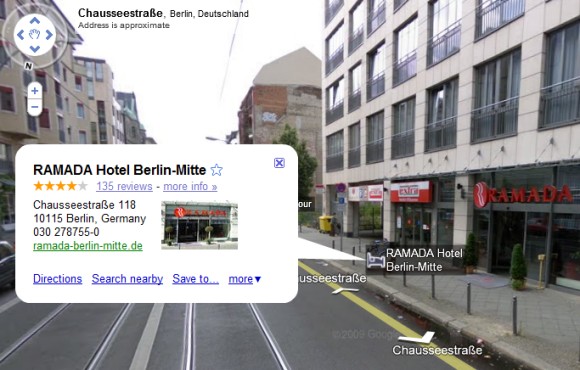1. Google Chrome's bookmark sync will be extended to sync the documents stored in Google Docs.
Not yet.
2. Google will launch a service that indexes and ranks web applications.
It's not exactly what I predicted, but Chrome Web Store could become a search engine for web apps.
3. Google will use different interfaces for displaying search results, depending on your query.
If you use a query that returns a lot of useful local search results, Google mixes local search results with regular web search results, while showing a small map in the right sidebar.
4. Google's search engine will group related results.
This feature is not available.
5. Google Image Search will let you upload an image and will show related images from the web.
You still need to use Google Goggles or TinEye.
6. Google Street View's images will become searchable and Google will start to show information about different places in Street View.

7. Google will release an online development environment optimized for building web applications.
Not yet.
8. An open platform for search experiments: tweak Google's ranking factors, customize the interface and create a better search engine.
Not yet.
9. Android will have more users than Windows Mobile.
According to Comscore, Android surpassed Windows Mobile in the US in July. Gartner estimates that more than 20 million Android phones were sold in the third quarter of 2010. That's 40% of the Windows Mobile devices sold until 2008.
10. Many browsers will copy Google Chrome's features: the simplified interface, the rapid development model, the lightweight extensions, sandboxing, compiling JavaScript code.
Safari and Opera added support for lightweight extensions, Firefox 4 dropped the status bar, almost all browsers dropped the classic menu bar, Internet Explorer 9 is surprisingly fast and standards-compliant.
11. Google Drive will finally launch, but it will only be an extended version of Google Docs. Instead of sending attachments, you'll be able to upload files to Google Drive from Gmail.
You can now upload any kind of file to Google Docs.
12. Google Wave won't become successful, but its features will be used in other Google products.
Google Wave has been discontinued, but many of its features are used in other services: the new Google Docs editor, Shared Spaces, contextual spell checking in Google Search.
13. Google will buy True Knowledge and will launch a fact search engine.
Google bought Metaweb, the company that developed Freebase, an "open, shared database of the world's knowledge".
14. Gmail's spam filtering algorithms will be more transparent and you'll be able to define custom rules for flagging messages as spam.
Google found an interesting way to make filtering messages more flexible: Gmail Priority Inbox. You can define custom rules for messages that aren't important and Google explains why certain messages are classified as important or not important.
15. Google Trends will show popular web sites from different categories.
Nope.
16. Google Desktop will be discontinued and replaced by Google Quick Search Box.
Nope.
17. If you use Google Chrome, you'll be able to use the most important features of Chrome OS.
Most of the Chrome OS features are available in Google Chrome: Cloud Print, integration with Chrome Web Store, synchronization, guest mode.
18. Google users will be able to add comments and start conversations if they want to find some information about a hot topic.
Google acquired Aardvark, a social service for answering questions.
19. Google Toolbar will be available for Chrome and Google will start to bundle Chrome with Google Toolbar for IE.
Nope.
20. Google will buy Spotify and make it available for free.
Google bought Simplify Media and intends to release a music store and an Android application for streaming music.








0 comments:
Post a Comment